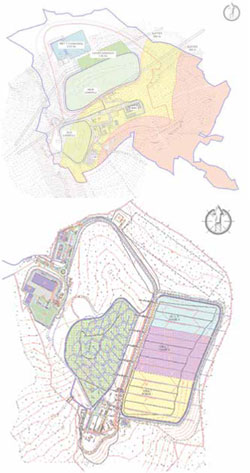KfW Projects in Serbia

Integrated Solid Waste Management Programme
Donor: Federal Ministry for Economic Cooperation and Development (BMZ)
Partners: Ministry of Construction, Transport and Infrastructure
Project period: 2019 – ongoing
Challenges
- Landfilling remains the predominant form of waste management.
- Large amount of non-compliant landfills and dumpsites pose a serious threat to the health of the population, environmental safety and biodiversity conservation.
- Serious deficiencies regarding waste collection and waste transport such as missing or outdated waste containers, the largely poor condition of the collection vehicles and ineffective route planning leads to considerable efficiency losses.
- Minimization of waste generation and reuse and recycling of waste is only at the beginning. Separate collection is scarce and related mostly to pilot projects by some municipalities.
- The tariffs do not cover the costs and do not allow solid waste management Public Utility Companies (PUC) to maintain, modernize or extend their infrastructure.
Approach
The purpose of the Integrated Solid Waste Management is to establish an environmentally and hygienically sound, climate friendly, sustainable and efficient solid waste management system in up to three solid waste management regions on their way towards EU compliance, at socially acceptable cost. This is to contribute to reduce and eliminate adverse impacts of municipal waste materials on human health, environment and climate as well as to support economic development and superior quality of life.
The programme is carried out in two phases:
- During the first phase the technical and design documents are prepared, and the municipalities and their solid waste management PUCs have to meet certain efficiency and performance criteria in order to qualify for the second phase (performance-oriented approach).
- The second phase involves investments in infrastructure for solid waste collection, recycling and treatment.
Results
- The design of the Programme is based on the priorities defined by the Serbian Government in the framework of EU accession negotiations in relation to Chapter 27.
- In parallel to the enhancement of municipal solid waste management and environment protection, the Programme concept foresees fostering of circular economy contributing to sustainable economy growth and new employment.
- The Programme encompasses the Solid Waste Management Regions (SWMR) of Krusevac and Vranje, while the process of identification and inclusion of the 3rd SWMR to the programme is ongoing.
- The following priority investment measures shall be implemented under the different investment phases of the Programme:
- Establishment of regional solid waste management centers with sanitary landfills.
- Introduction of separate collection of recyclable materials and organic waste.
- Introduction of material recovery of recyclable products, in particular by establishing secondary sorting facilities at the regional solid waste management centers.
- Establishment of adequate capacity for waste transfer and transportation.
- Support of composting for organic waste (centralized and home level).
- Introduction of mechanical biological treatment (MBT).
- Closure of dumpsites and unsanitary landfills.
- Pronounced climate benefits are expected – reduction of CO2 emission of 36.000 t/year in Kruševac SWMR and further 30.000 t/year in Vranje SWMR.
- The Phase I (preparatory phase) is successfully completed for Kruševac and Vranje SWMRs.
- The Phase II (investment phase) is expected to start during 2023.

